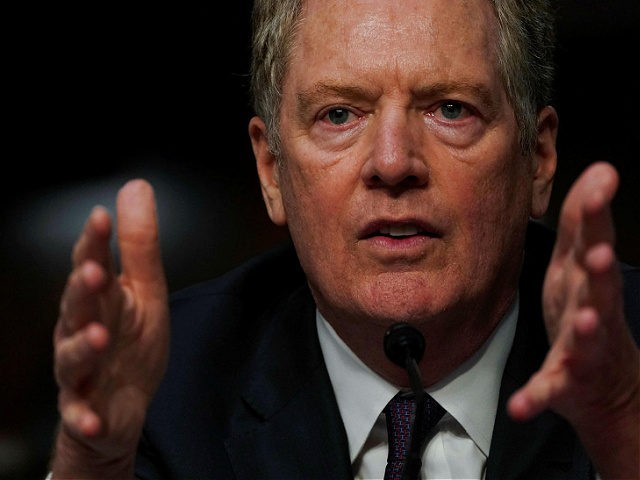United States Trade Representative (USTR) Robert Lighthizer says President Donald Trump’s commitment to economic nationalism “changed the way people think about China” as free trade globalists admit their failures.
In a rare interview with the Wall Street Journal, Lighthizer notes that his tenure has marked a directional shift not only in Washington, DC, but also vastly among the American public with the majority turning on the hyper globalization that has gutted communities across the U.S. for decades.
That shift has broken with the free trade consensus of ignoring trade deficits, along with its job-killing impact, and moved toward a policy of protecting American industry, jobs, and wages.
“We want a China policy that thinks about the geopolitical competition between the United States and an adversary—an economic adversary,” Lighthizer told the Journal, adding:
“We transformed the way people think about trade, and we transformed the way the models are,” Mr. Lighthizer said in an interview. “My hope is that that will continue.” [Emphasis added]
…
“We’ve protected our automobile industry, our auto parts industry,” Mr. Lighthizer said. [Emphasis added]
Meanwhile, critics of Trump’s economic nationalist agenda admit the administration’s effectiveness in refocusing trade policy to protect American workers:
Mr. Lighthizer’s free-trade critics acknowledge his influence. “He is the most consequential trade representative” since President Kennedy created the position in 1963, said Gary Hufbauer, a Peterson Institute for International Economics senior fellow. “He reversed the disposition toward globalization.” [Emphasis added]
Most notably, Lighthizer is pleading with President-elect Joe Biden’s incoming administration to keep in place Trump’s tariffs on billions of dollars worth of Chinese imports among other tariffs. Last year, Biden said he would lift tariffs on China but eventually walked back the statement.
In October 2020, Biden said he plans to allow U.S. allies in Europe and elsewhere to decide whether his administration should keep tariffs on China or not. Lighthizer said this strategy “did nothing” in the past and called it “a waste of time.”
Biden comes to the White House with an undeniable record of supporting the kind of job-killing free trade and globalization of the American economy that Trump has denounced for decades. That record has helped make Biden friendly with multinational corporations, Silicon Valley, and Wall Street — all of which benefit massively from outsourcing manufacturing to foreign countries that tolerate slave labor.
Before even taking office, Biden is being lobbied by corporate interests and factions of House Republicans and Democrats to drop U.S. tariffs on China in the midst of the Chinese coronavirus crisis. Likewise, U.S. companies that make their products in China overwhelmingly say they are “optimistic” about Biden’s presidency.
Since 2001, U.S. free trade with China has eliminated at least 3.4 million American jobs. In 1985, before China entered the WTO, the U.S. trade deficit with China totaled $6 billion. In 2019, the U.S. trade deficit with China totaled more than $345 billion.
American manufacturing is vital to the U.S. economy, as every one manufacturing job supports an additional 7.4 American jobs in other industries.
John Binder is a reporter for Breitbart News. Follow him on Twitter at @JxhnBinder.

COMMENTS
Please let us know if you're having issues with commenting.